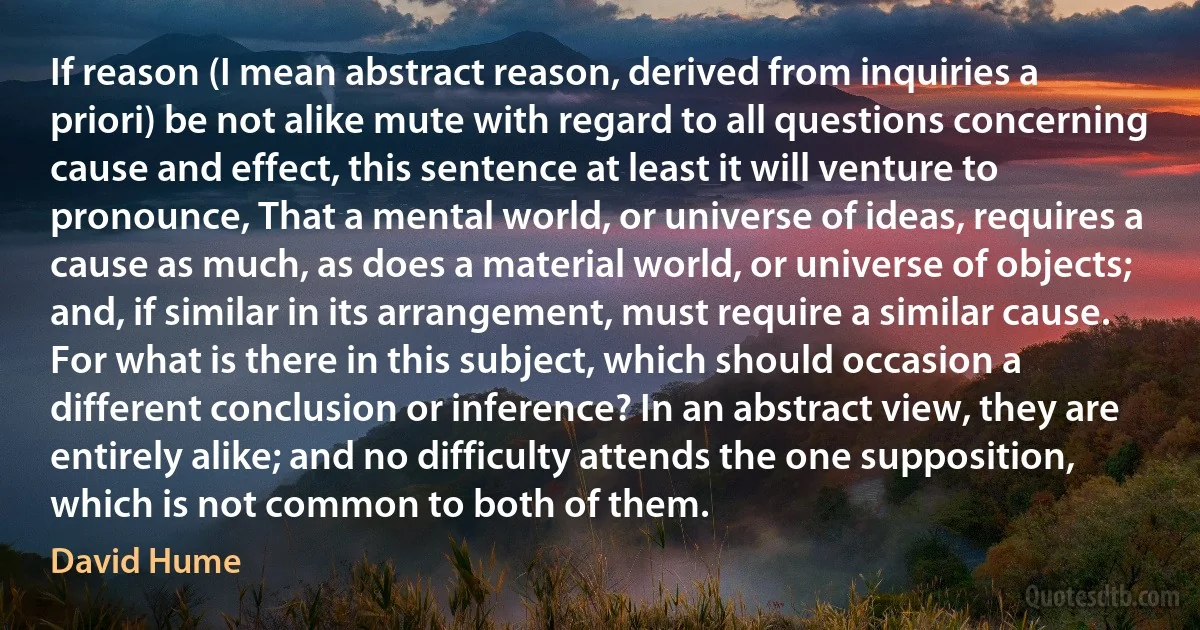
If reason (I mean abstract reason, derived from inquiries a priori) be not alike mute with regard to all questions concerning cause and effect, this sentence at least it will venture to pronounce, That a mental world, or universe of ideas, requires a cause as much, as does a material world, or universe of objects; and, if similar in its arrangement, must require a similar cause. For what is there in this subject, which should occasion a different conclusion or inference? In an abstract view, they are entirely alike; and no difficulty attends the one supposition, which is not common to both of them.
David HumeRelated topics
abstract arrangement cause common different difficulty inference least mean occasion pronounce reason should supposition venture view world questionsRelated quotes
Yeah, our view of reality, the one we conventionally take, is one among many. It's pretty much a fact that our entire universe is a mental construct. We don't actually deal with reality directly. We simply compose a picture of reality from what's going on in our retinas, in the timpani of our ears, and in our nerve endings. We perceive our own perception, and that perception is to us the entirety of the universe. I believe magic is, on one level, the willful attempt to alter those perceptions. Using your metaphor of an aperture, you would be widening that window or changing the angle consciously, and seeing what new vistas it affords you.

Alan Moore
Since most subjects studied in school consist largely of theories... language education must include not only the serious study of what truth and falsehood mean in the context of a subject, but also what is meant by a fact, an inference, an assumption, a judgment, a generalization... In this way students will be learning both the language of a subject and the methods of inquiry in that subject, since inquiry consists of nothing else but the generation of questions, the invention of definitions and metaphors, the separation of facts from inferences, the forming of generalizations...

Neil Postman
The only part of evolution in which any considerable interest is felt is evolution applied to man. A hypothesis in regard to the rocks and plant life does not affect the philosophy upon which one's life is built. Evolution applied to fish, birds and beasts would not materially affect man's view of his own responsibilities except as the acceptance of an unsupported hypothesis as to these would be used to support a similar hypothesis as to man. The evolution that is harmful- distinctly so - is the evolution that destroys man's family tree as taught by the Bible and makes him a descendant of the lower forms of life. This ... is a very vital matter.

William Jennings Bryan
What is a Poet?...He is a man speaking to men: a man, it is true, endowed with more lively sensibility, more enthusiasm and tenderness, who has a greater knowledge of human nature, and a more comprehensive soul, than are supposed to be common among mankind; a man pleased with his own passions and volitions, and who rejoices more than other men in the spirit of life that is in him; delighting to contemplate similar volitions and passions as manifested in the goings-on of the Universe, and habitually impelled to create them where he does not find them.

William Wordsworth
To say that a thing is imaginary is not to dispose of it in the realm of mind, for the imagination, or the image making faculty, is a very important part of our mental functioning. An image formed by the imagination is a reality from the point of view of psychology; it is quite true that it has no physical existence, but are we going to limit reality to that which is material? We shall be far out of our reckoning if we do, for mental images are potent things, and although they do not actually exist on the physical plane, they influence it far more than most people suspect.

Dion Fortune
